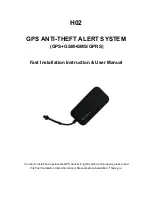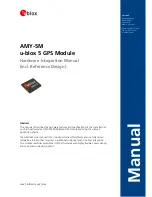
WinFrog User’s Guide - Appendix C – GPS/MX 9400
Page 4 of
22
Type 12 Bin:
This is a Leica proprietary data format containing satellite measurement data in a
compressed binary format, output through the Instrumentation / Raw Data port
Alm/Eph:
This refers to the output of GPS Ephemeris and Almanac data in a Leica proprietary
format though the Instrumentation / Raw Data port. The Ephemeris data records
(Leica type 200 proprietary format), are output once an hour for each satellite being
tracked. The Almanac data records (Leica type 100-150 proprietary format), are
output at the request of WinFrog by sending the $PMVXG,074 message).
Time Rec:
This refers to the output of GPS Time recovery data (values computed by the
navigation filter relating to the receiver clock state) through the Instrumentation /
Raw Data port.
If you are using the MX9400 to simply provide a position to WinFrog, you can select
to send only the $GPGGA (preferred) or the $GPGLL item. As defined above, by
default, these NMEA messages are output from the Data Logging port (i.e. port 4). In
order to interface to the MX9400 through just one of its ports, you must reassign this
output to another port - port 1. (Port 1 must be interfaced to WinFrog in order for the
CDU commands to be received, so this is the port of choice). To reassign the output
of NMEA data to Port 1, select the bottom left checkbox.
To further clarify the re-assignment of the MX9400 ports, shown below are several
different configurations of the Configure MX Serial Ports dialog box.
The first configuration shown below retains the MX9400’s default port configuration:
i.e. the Control and data messages (referred to as “BSC” in WinFrog) are made
through port 1, the Instrumentation/Raw Data (“RS/IM”) are output through port 2,
Differential RTCM (RTCM) is input/output through port 3, and Equipment/NMEA
(Data Logging) messages are output through port 4. This configuration would require
you to connect all four of the MX9400’s ports to the WinFrog computer.





































